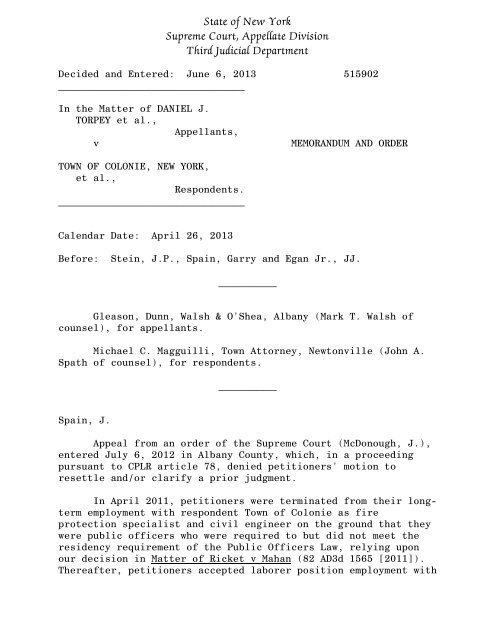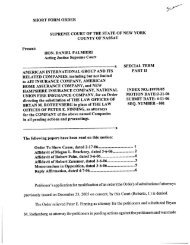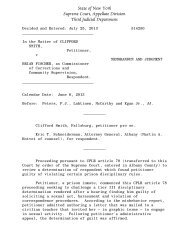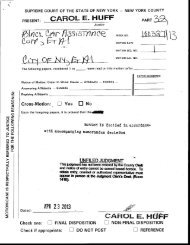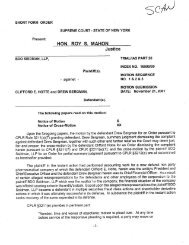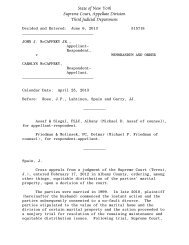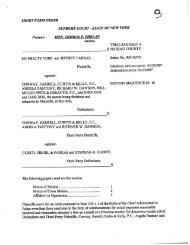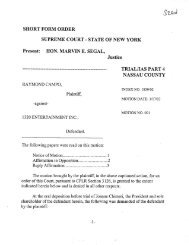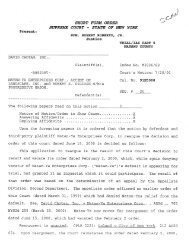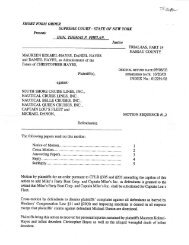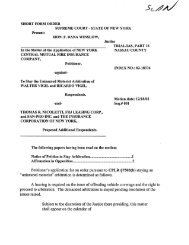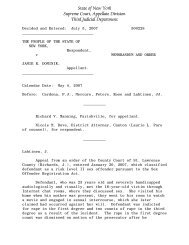515902 Matter of Torpey v Town of Colonie, New York
515902 Matter of Torpey v Town of Colonie, New York
515902 Matter of Torpey v Town of Colonie, New York
Create successful ePaper yourself
Turn your PDF publications into a flip-book with our unique Google optimized e-Paper software.
State <strong>of</strong> <strong>New</strong> <strong>York</strong><br />
Supreme Court, Appellate Division<br />
Third Judicial Department<br />
Decided and Entered: June 6, 2013 <strong>515902</strong><br />
________________________________<br />
In the <strong>Matter</strong> <strong>of</strong> DANIEL J.<br />
TORPEY et al.,<br />
Appellants,<br />
v<br />
MEMORANDUM AND ORDER<br />
TOWN OF COLONIE, NEW YORK,<br />
et al.,<br />
Respondents.<br />
________________________________<br />
Calendar Date: April 26, 2013<br />
Before: Stein, J.P., Spain, Garry and Egan Jr., JJ.<br />
__________<br />
Gleason, Dunn, Walsh & O'Shea, Albany (Mark T. Walsh <strong>of</strong><br />
counsel), for appellants.<br />
Michael C. Magguilli, <strong>Town</strong> Attorney, <strong>New</strong>tonville (John A.<br />
Spath <strong>of</strong> counsel), for respondents.<br />
__________<br />
Spain, J.<br />
Appeal from an order <strong>of</strong> the Supreme Court (McDonough, J.),<br />
entered July 6, 2012 in Albany County, which, in a proceeding<br />
pursuant to CPLR article 78, denied petitioners' motion to<br />
resettle and/or clarify a prior judgment.<br />
In April 2011, petitioners were terminated from their longterm<br />
employment with respondent <strong>Town</strong> <strong>of</strong> <strong>Colonie</strong> as fire<br />
protection specialist and civil engineer on the ground that they<br />
were public <strong>of</strong>ficers who were required to but did not meet the<br />
residency requirement <strong>of</strong> the Public Officers Law, relying upon<br />
our decision in <strong>Matter</strong> <strong>of</strong> Ricket v Mahan (82 AD3d 1565 [2011]).<br />
Thereafter, petitioners accepted laborer position employment with
-2- <strong>515902</strong><br />
the <strong>Town</strong>, for which there is no residency requirement.<br />
Petitioners commenced the underlying CPLR article 78 proceeding<br />
against respondents alleging that their terminations were<br />
arbitrary and capricious and affected by error <strong>of</strong> law and,<br />
accordingly, should be annulled. Petitioners sought to be<br />
reinstated to their former positions "with full back pay,<br />
benefits and emoluments <strong>of</strong> employment."<br />
Supreme Court determined that petitioners had been<br />
erroneously terminated, finding that respondents had not shown<br />
that they were public <strong>of</strong>ficers subject to the residency<br />
1<br />
requirements. The court granted the petition, concluding that<br />
petitioners were "entitled to be reinstated to their former<br />
positions and to all back pay and associated benefits to which<br />
they would have been entitled had they not been improperly<br />
terminated." Respondents did not appeal from that judgment.<br />
Thereafter, a dispute arose among the parties regarding, among<br />
other things, the meaning <strong>of</strong> the court's directive that<br />
petitioners were entitled to "all back pay," i.e., whether the<br />
back pay awards must be <strong>of</strong>fset against petitioners' earnings<br />
while employed by the <strong>Town</strong> as laborers, as respondents urged, or<br />
whether they were entitled to full back pay without such <strong>of</strong>fset,<br />
as petitioners claimed (see Civil Service Law §§ 75 and 77).<br />
Petitioners moved in Supreme Court in February 2012 to resettle<br />
and/or clarify the court's prior judgment regarding back pay.<br />
The court denied the motion, finding it represented an improper<br />
attempt to amplify and expand upon its prior decision.<br />
Petitioners now appeal.<br />
Petitioner's motion was one to resettle and/or clarify<br />
Supreme Court's prior judgment regarding back pay. Such a motion<br />
is designed "not for substantive changes [in, or to amplify a<br />
prior decision <strong>of</strong>, the court], but to correct errors or omissions<br />
in form, for clarification or to make the [judgment] conform more<br />
accurately to the decision" (Simon v Mehryari, 16 AD3d 664, 666<br />
[2005]; see Elson v Defren, 283 AD2d 109, 113 [2001]; Gannon v<br />
Johnson Scale Co., 189 AD2d 1052, 1052 [1993]; see also Miller v<br />
1<br />
Supreme Court denied petitioners' request for counsel<br />
fees, costs and disbursements.
-3- <strong>515902</strong><br />
Lanzisera, 273 AD2d 866, 867-868 [2000], appeal dismissed 95 NY2d<br />
887 [2000]). Such motions rest on the inherent power <strong>of</strong> courts<br />
to "'cure mistakes, defects and irregularities that do not affect<br />
substantial rights <strong>of</strong> [the] parties'" (Bennett v Bennett, 99 AD3d<br />
1129, 1129 [2012], quoting Kiker v Nassau County, 85 NY2d 879,<br />
881 [1995]; see <strong>Matter</strong> <strong>of</strong> Owens v Stuart, 292 AD2d 677, 678<br />
[2002]).<br />
Here, petitioners' motion sought, unsuccessfully, to<br />
amplify and substantively amend, not merely to clarify, Supreme<br />
Court's prior judgment relating to back pay, by invoking for the<br />
first time Civil Service Law provisions in support <strong>of</strong> their<br />
argument that the back pay award should not be <strong>of</strong>fset by earnings<br />
as <strong>Town</strong> employees during the period in which they had been<br />
improperly terminated, points which should have been raised and<br />
argued before a determination was rendered on their petition (see<br />
Gannon v Johnson Scale Co., 189 AD2d at 1052). Such an <strong>of</strong>fset<br />
would directly affect the amount <strong>of</strong> back pay owed by the <strong>Town</strong><br />
and, as such, would clearly have "alter[ed] [a] substantial<br />
right[] <strong>of</strong> the parties" (Bennett v Bennett, 99 AD2d at 1130; see<br />
Gannon v Johnson Scale Co., 189 AD2d at 1052; Tidball v Tidball,<br />
108 AD2d 957, 958 [1985]).<br />
Under established precedent, no appeal lies from the<br />
"'denial <strong>of</strong> a motion to resettle [or clarify] a substantive<br />
portion <strong>of</strong> an order'" (<strong>Matter</strong> <strong>of</strong> Biasutto v Biasutto, 75 AD3d<br />
671, 672 [2010], quoting Tidball v Tidball, 108 AD2d at 958; cf.<br />
Stevenson v Lazzari, 16 AD3d 576, 578 [2005] [order denying<br />
motion for resettlement is appealable because the motion merely<br />
sought to amend the judgment to reflect the undisputed fact that<br />
all claims had been dismissed]; Bullion v Metropolitan Transp.<br />
Auth., 161 AD2d 168, 168 [1990] [denial <strong>of</strong> motion to resettle<br />
which does not modify any substantive portion <strong>of</strong> judgment is<br />
appealable]). Moreover, even were we to view petitioners' motion<br />
as one to reargue, which Supreme Court indicated would have been<br />
untimely (see CPLR 2221 [d] [3]), the motion was not "identified<br />
specifically as such" (CPLR 2221 [d] [1]), as required, and, in<br />
any event, no appeal lies from the denial <strong>of</strong> a motion to reargue<br />
(see Reynolds v Reynolds, 92 AD3d 1109, 1110 [2012]). The motion<br />
likewise was not denominated as one seeking renewal (see CPLR<br />
2221 [e] [1]) and was not based upon "new facts" or "a change in
-4- <strong>515902</strong><br />
the law" (CPLR 2221 [e] [2]). Accordingly, the appeal must be<br />
dismissed.<br />
Stein, J.P., Garry and Egan Jr., JJ., concur.<br />
ORDERED that the appeal is dismissed, without costs.<br />
ENTER:<br />
Robert D. Mayberger<br />
Clerk <strong>of</strong> the Court


